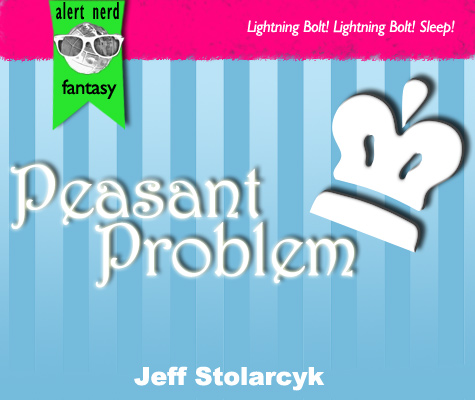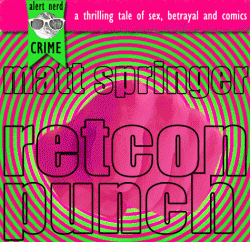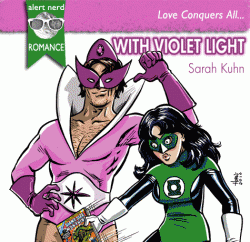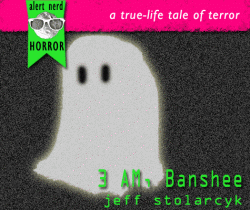We Are The Enemy
Feb 05
We Are The Enemy
I’ve been thinking about comics. Because that’s basically what I do with most of my free time. In particular, I’m thinking about Grant Morrison’s (maybe not so) drug-addled, oft-quoted goal of making the DC Universe “sentient.”
On the surface, that quote makes no fucking sense, but beneath it hints at the sort of depth that the best of GMozz’s ideas plunge into. It seems insanity and promises greatness. We like the idea because it embodies exactly what we like about the comics we read – especially if you are, like I am, a devotee of the really out-there Kirby, Haney, Kanigher and Mantlo stuff that may not make sense but is indisputably awesome in the current and original senses of the word both.
After reading Final Crisis, that zany quote from everyone’s favorite alien-abducted magus makes a bit more sense. Sense because the entire (if slightly veiled) point of the event’s endgame is that the story keeps going on without us. It is its own entity, telling its own story. Storytelling – or more aptly – a kind of Platonic ideal of Story – is the very premise that Superman Beyond is constructed on. Final Crisis #7 is framed as a bedtime story told to children.
The more interesting bit of meta-commentary seeded here is Morrison’s painting of the reader – the fan – as the enemy of The Story. In fact, DC’s been doing that since Infinite Crisis when it revealed that the good-hearted fanboy who saved the universe in the first Crisis had transmogrified into a sullen, nitpicking murderer hell-bent on changing the universe into what he thinks it should be/needs to be (and ultimately decides that what he really wants is his universe back – an echo of the fans that say things like, “The Detroit JLA is my Justice League and I won’t read any other version”). In Final Crisis and its infinite lead-ins, the Monitors serve the same function – nattering and infighting over which version of which character or legacy is the canonical one.
Are we really the bad guys? Sometimes, when we lose sight of what we love about comics, we can sure seem that way. When we focus too much on the Creators (to the point of either trashing or deifying them unfairly) and not on the Story, or when we’re mean instead of actually critical about a plot twist that we don’t like, we are. Because it’s easier and more fun, I suspect we don’t celebrate what we love about the artform nearly enough. But then, maybe the creators need a thicker skin.
What do you think? Are comics fans hurting comics?










You should listen to episode #573 of Comic Geek Speak. One of their contributors breaks-down Superman Beyond#2 and FC #7 and explains these topics in detail, going over every little hint that Morrison planted.
The power of stories defeated Mandrakk.
CGS #573
Hmm. . .on the one hand, the more time I spend around fandom, the more sympathy I have for (most) creators and the less I have for (many) fans. The creators are in a deadline-driven business (deadlines are applied to MOST of them, anyway), they have to get something out there, and if it’s not always brilliant or even entertaining, it very often is.
Fans have to. . .well post to message boards about whether something is awesome or sucked. We don’t actually have to provide well thought-out criticism, much less actually invent something ourselves.
On the other hand — 90% of everything is crap and the barriers to entry in the discussion, for comics, are pretty damn low. So if you judge ‘fans’ from any random group you happen to stumble upon, it might not look that great. But I’ve been privileged to find some quite excellent criticism by fans — online and elsewhere, but mostly online b/c the low barriers to entry have their advantages if you want to write or read about a very niche market. So I think that negative perceptions creators have of fans may have as much to do with their filters, and what they expect to see, as what’s out there.
I guess, in conclusion, something I learned as a teacher (and I can say this because I’m not a teacher anymore) — there are jerks and idiots in every class; you can’t direct your teaching at the jerks and idiots. You find the people who actually want to reach, as a writer, and you direct what you have to say at them.
Yeah, what Caroline said!
Also, it’s an interesting allegory, but also weird, since unlike Superboy Prime and the Monitors, virtually NO fans can actually reach into the universe and make changes…
…although it does sorta jibe with the whole idea that when all the various pieces of information are splayed out in front of you, it’s up to each fan to really decide what their own personal DCU looks like. I have a friend who basically says the animated DCU is the only DCU he cares about. or if you hate a story and choose to ignore it, then that’s expunged from your universe; mine may still have it, but expunge stuff that you like that I think is stupid.
I liked the hope in the ending. It was really beautiful. Not just the epilogue but the entire concluding section.
“And nobody got hurt.”
I loved it.
Maybe I’m weird, but I’ve never been a “that NEVER HAPPENED” fan. Everything is stet for me, whether I agree with it or not. Maybe it was being raised by and dating and marrying rabid soap fans. Probably it’s all the Roy Thomas I devoured as a tyke. Which is why I really liked a lot of the “all of these Silver Age things still happened to Batman” bent in the Black Glove storyline. It strikes me as the antithesis of that sort of selectivity. It makes everything valid.